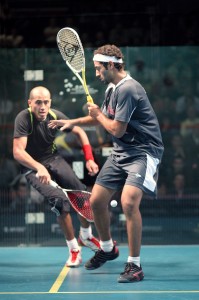By Barry Faguy, WSF Referees and Rules Committee
If there’s any form of interference where decisions appear to be all over the map, and where misconceptions abound, this is it. No doubt you have sometimes (OK, OK, often) been left perplexed after seeing apparently contradictory decisions on similar situations relating to the swing. Well, this (necessarily short) article has to leave out some swing-related issues, and might not resolve all your swing-interference scenarios, but I’ll wager that it will nonetheless make your life easier.

THE MAIN RULE
The Referee shall award a stroke to the player if: (12.8.2) there was interference, which the opponent made every effort to avoid, but the opponent’s position prevented the player’s reasonable swing and the player would have been able to make a good return…
You’ll notice that, even though the opponent has indeed made every effort to avoid the interference—we just don’t give a da… er .. we just don’t care. The Stroke is awarded anyway—and the reason will soon be revealed. It states that if the Referee concludes that a reasonable swing was “prevented” (whatever that means!)—then the opponent is toast.
Let’s look at a few elements.
THE KEY PRINCIPLES
1) The swing is practically sacred
The striker can often put up with quite a bit of interference to, say, getting to the ball—often colliding big-time with the non-striker and merrily continuing on anyway. The view of the ball can often be obliterated—yet the striker continues. But the actual swing? No way! Just think of the times you’ve simply clipped the wall just before hitting the ball, or when you’ve touched your opponent on the backswing. The result is anything but what you intended. The swing is a sensitive movement—very sensitive—and tolerates virtually no actual impediment. The urge to grant a Stroke against the player who causes this problem is powerful.
However, the rule-makers, sensitive to the above, aware of the frequency of such interferences, and wanting to avoid a constant litany of strokes—have struck a balance. They’ve introduced a few other considerations before ”Stroke“ can be concluded.
2) We’re talking “amount”—not ”affect“
Read all the wording relating to decision-making about the swing and you’ll see that there is no reference to what happens to the return of the ball itself (the effect of the interference). As noted above, it’s virtually always disastrous. Instead, the wording focuses on the amount of impediment to the swing itself—thus involving the racket or arm.
THE KEY WORDS
Since 2001, the rules have introduced two key words to help us decide swing issues: “prevented” and “affected.” Unfortunately, there’s barely a word about what they mean, so let’s see what can be done to help.
 Prevented By any definition, this word means “a lot”—and we have it on good authority that, even though there is no actual measurement, it is meant to refer to concepts like “no swing possible” or “gross interference”—indicating situations where the motion of the swing (racket or arm) cannot carry on. It is stopped. Cement that idea into your head and you’ve taken a significant step ahead.
Prevented By any definition, this word means “a lot”—and we have it on good authority that, even though there is no actual measurement, it is meant to refer to concepts like “no swing possible” or “gross interference”—indicating situations where the motion of the swing (racket or arm) cannot carry on. It is stopped. Cement that idea into your head and you’ve taken a significant step ahead.
Affected This word refers to whatever is less than “prevented.” All of this is, of course, on an infinitely varying scale, but it’s easy to imagine situations where the continued motion of the swing can carry on—albeit deflected to varying degrees. Cement that one in there too.
Major & Minor In order to make this as colloquial as possible, I’ve replaced ”prevented“ and “affected” with these two words—simply because they are instinctively understood and are contrasting concepts. This should now allow us to create a compact and memorable summary to sort it all out.
THE NUTSHELL SUMMARY
So, with the help of all the above, we can reasonably conclude the following:
Major interference: Stroke—no matter the non-striker’s effort to clear.
Minor interference: 1) Stroke—if the non-striker’s effort was unacceptable; 2) Let—if the non-striker’s effort was acceptable.
CAUTIONARY NOTE: You might want to consider the possibility that, if you give strokes too easily for swing interference, you can be sure players will take advantage of your largesse and will be calling on you quite often to repeat that generosity.
This is a condensation of a much longer article written for officials, found at: (www.squash.ca/e/officiating/tso/october2003/swing_straight.htm)


